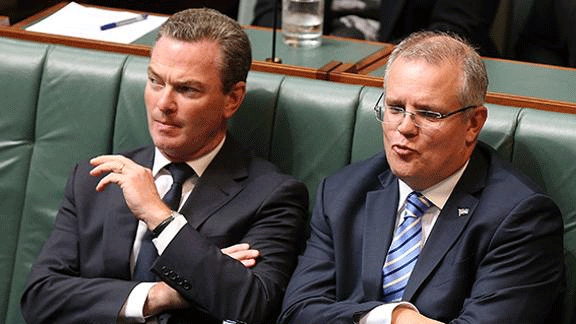How the fix failed

Repeated attempts by the federal government to reset and refocus have failed.
The bosses, through their mouthpiece organisations such as the Business Council and the Chamber of Commerce and Industry, continue valiantly to plead the case for the government to change tack and undertake the giant tasks of overhauling the tax and IR systems in the interests of the rich. But they seem to be pleading to the future.
This government is too worn down by last year’s budget to offer much relief to the corporate world. It staked its claim to office on restoring fiscal “balance”. But Financial Review estimates are that the bottom line has blown out by at least $80 billion since the election.
The government’s own estimate is that people studying at university today will not witness a federal surplus until they are nearing retirement. And that relies on the very generous assumption that the economy will grow continuously at close to 3 percent for the next 40 years.
This is not the biggest economic problem facing the country. Indeed, enough voices can be heard calling for governments to increase borrowing now to lock in low interest rates for new, growth-supporting infrastructure.
But is a significant political problem for the government, given the way it has positioned itself. Its problem is even greater given that Abbott pledged to restore trust in government yet broke election promise after election promise from day one – and with a bumptious crash or crash through attitude.
It crashed so fast and so hard that even big business could not but look on in awkward silence. With a mass public backlash against the budget, tens of billions in cuts stalled in the Senate and revenue growth projections being hammered by collapsing commodity prices, treasurer Joe Hockey complained at a public service conference in Canberra last July: “Everyone is against me … [W]ho is keeping the pressure on both sides of politics to develop the bipartisan support for real reform? … The business community is weaker than it has been over many years, as a voice.”
Australian Industry Group chief executive Innes Willox felt compelled to respond, if only to distance the ruling class from its bungling representatives: “It’s not the role of the business community to be cheerleaders” for a Liberal government, he said.
If the Liberals last year thought big business had abandoned them, there is now a sense in which the government has abandoned big business for its own self-preservation. Abbott’s hold on the Liberal leadership remains tenuous. He has squandered all of his political capital and is scrambling to shore up support. Yet in doing so he has jettisoned the ruling class’s “reform agenda”.
Almost nothing that the bosses want will be delivered by an Abbott government. Raising or broadening the base of the GST is off the table for now, and any serious overhaul of the tax system is out of the question; federal-state relations have been placed in the too hard basket; significant IR changes also are off the table.
The government desperately needs wins, but can only orchestrate humiliating defeat after defeat. That only makes team Abbott look weaker and more incompetent, thereby more likely to be rolled by the party room and even less likely to get the backing of the ruling class.
Even with a new Liberal leader, little is likely to shift in these areas until after a new election. That’s probably the best case scenario for the bosses.
There’s the productivity agenda – but with investment flat, the government cut back research and development tax concessions for large projects and abolished eight industry assistance bodies.
That leaves the failed federal budget. What to do about that? Perform a complete back flip.
After banging on for several years about the debt and deficit crises, and for months about the need for tough action and how the Senate is jeopardising the future of the country, and just as the revenue projections are being further hit by the collapse in commodity prices, Abbott now says that future projections of unending deficits are “a pretty good result”.
What’s that old saying? “If you can’t dazzle them with brilliance, baffle them with bullshit”.